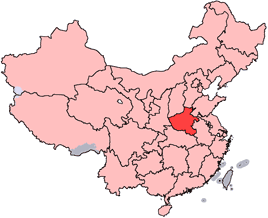Battle of Suiyang
| Battle of Suiyang | |||||||||
|---|---|---|---|---|---|---|---|---|---|
| Part of the An Shi Rebellion | |||||||||
 . .Suiyang was in modern day Shangqiu, Henan |
|||||||||
|
|||||||||
| Belligerents | |||||||||
| Tang Dynasty | Yan Dynasty | ||||||||
| Commanders and leaders | |||||||||
|
Zhang Xun Nan Jiyun Xu Yuan |
Li Tingwang Yang Chaozong Yin Ziqi |
||||||||
| Strength | |||||||||
| 10,000 | 150,000 | ||||||||
| Casualties and losses | |||||||||
| 9,600 soldier deaths 20,000-30,000 civilians were eaten |
60,000 soldier deaths | ||||||||
| Follows the Battle of Yongqiu | |||||||||
The Battle of Suiyang (睢陽之戰) was a battle in Suiyang during the An Shi Rebellion, between the rebel An Lushan's Yan army and the loyalist forces of the Chinese Tang army. Although the battle was ultimately won by Yan, it suffered a major loss of manpower and time. The battle was noted for Tang army's determination to fight to the last man, and also due to the cannibalism that occurred during the siege.
In January 757 AD, An Lushan was killed by his own son An Qingxu (安慶緒). In the same month, An Qingxu ordered general Yin Ziqi (尹子奇) to besiege Suiyang. Yin Ziqi joined with Yang Chaozong before the siege, with a total army size over 130,000 men. The governor of Suiyang at the time, Xu Yuan (許遠), heard of Zhang Xun's fortress defence abilities in the Battle of Yongqiu and asked him for help. Zhang Xun knew that if Suiyang fell, the rest of Tang's territory south of the Yangtze River would be threatened. He agreed to help immediately.
The united army of Zhang Xun and Xu Yuan, around 7,000 men, prepared to defend Suiyang with their lives. Xu Yuan focused on supplies management and after-battle repairs. Zhang Xun, on the other hand, focused on battle tactics.
Despite daily sieges by the Yan army, the Tang soldiers never let up. Zhang Xun's troops played the war-drums during the night, acting as if they were going to fight (a tactic that army apparently had used before). Consequently, the Yan army were forced to stand on guard during the night, and suffered from the lack of sleep. Eventually, some troops did not bother to put on their armor when they heard these battle drums, and kept sleeping. After the Yan army lowered their defenses, Zhang Xun's forces ambushed them very successfully.
Zhang Xun had long wanted to give the Yan morale a major blow, and the best way to do this would be to hurt or kill the Yan general Yin Ziqi. However, in an age before photography, the problem was that Zhang had no idea what Yin Ziqi looked like, not to mention he would be in a mix of soldiers. Zhang therefore turned to psychology. He ordered his troops to shoot weeds, instead of arrows, at a few enemy soldiers. When these soldiers noticed that they were being shot by weeds, hence were not killed, they were overjoyed. They promptly ran to Yin Ziqi to report that the Tang army had already run out of arrows. Zhang Xun noticed where the soldiers ran and ordered his best archers to shoot at Yin Ziqi. One such arrow hit Yin Ziqi in his left eye, throwing the Yan army instantly into chaos. The siege ended with the expected major blow to the Yan morale.
...
Wikipedia
